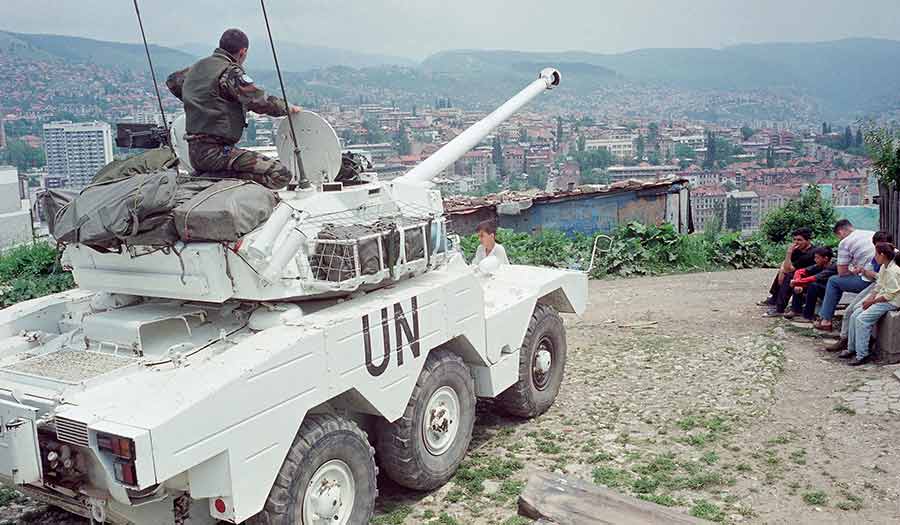 AP/Jerome Delay
AP/Jerome Delay
World News Desk
Learn the why behind the headlines.
Subscribe to the Real Truth for FREE news and analysis.
Subscribe NowACCRA, Ghana (AP) – The United Nations’ top peacekeeping official defended the organization’s missions worldwide as concerns grow that they have gone into retreat as African leaders demand their withdrawal from Mali to Congo.
Under Secretary-General for Peace Operations Jean-Pierre Lacroix said Wednesday that the force operates on a $5.5 billion budget, which is less than that of the New York City Police Department, even though its force is much larger, with 70,000 personnel worldwide. He told delegates at a UN peacekeeping ministerial meeting in the Ghanaian capital, Accra, that efforts had been hampered by divisions among member states.
The majority of UN peacekeeping missions are in Africa, including in Central African Republic, Sudan and Western Sahara. However, they have faced increasing blowback and scrutiny over their ability to successfully carry out their missions, including protests in Congo from residents claiming peacekeepers did little to protect them from armed groups.
The operations, which require approval from the UN Security Council to be extended, have gradually gone into retreat in Africa. In June, leaders in Mali requested the United Nations withdraw peacekeeping forces. Leaders from Congo made a similar request to the Security Council in September.
Congolese President Felix-Antoine Tshisekedi said then that the mission had failed to confront fighting, but on Wednesday Mr. Lacroix defended the force, telling reporters that the UN had received feedback from residents that they wanted the peacekeepers to do more.
“Peacekeeping can only operate if the U.N. has the sovereign support,” Mr. Lacroix said of Congo.
The two-day ministerial meeting in Accra is taking place as polarizing divides emerge among United Nations member states about wars in Ukraine and Gaza. Institutions like the United Nations Security Council—which has a mandate to maintain international peace and security—have struggled to reach consensus on Israel’s latest war with Hamas militants that began in October.
Though Mr. Lacroix lamented how the peacekeeping budget was a mere 0.3 percent of global military spending, he also noted that it provides a good return on investment as peacekeepers save lives for relatively little cost.
Peacekeepers, he said, operate in the face of armed groups, terrorists and criminal networks with access to lethal weaponry. They work among improvised explosive devices and face growing threats from “the weaponization of digital tools,” he said, including hate speech and disinformation that often has fueled violence against peacekeepers and the communities they’re tasked with protecting.
“Despite the challenges we are facing, we continue to do our utmost to strengthen the impact and effectiveness of these operations. We continue to do what we can to advance political solutions and support sustainable peace, including through facilitating political settlements and supporting locally led conflict resolution,” Mr. Lacroix said.
Though Congolese leaders have asked the UN to begin withdrawing, Mr. Lacroix said peacekeepers were providing logistical support for this month’s elections at the request of authorities, particularly in North and South Kivu and Ituri provinces. Since 1999, peacekeepers have been in Congo’s impoverished but mineral-rich east, where rebel groups including M23 have long clashed with the government.
Ghana Vice President Mahamadu Bawumia said UN member states should work to improve peacekeeping missions rather than give up on them. He also noted growing risks to peacekeepers that threaten their ability to carry out their mandates and stabilize the regions where they operate.
- Personals
- RELIGION
 Man’s Insoluble Problems—Why?
Man’s Insoluble Problems—Why?
More on Related Topics:
- More Aid Workers Have Been Killed in 2024 Than in Any Other Year, UN Says
- Vladimir Putin Touts Russia’s New Missile and Delivers a Menacing Warning to NATO
- Top War-crimes Court Issues Arrest Warrants for Benjamin Netanyahu and Others in Israel-Hamas Fighting
- Thousands of North Korean Troops in Russia. What Does That Mean for the War with Ukraine?
- Why the Olympics Can’t Unite the World


